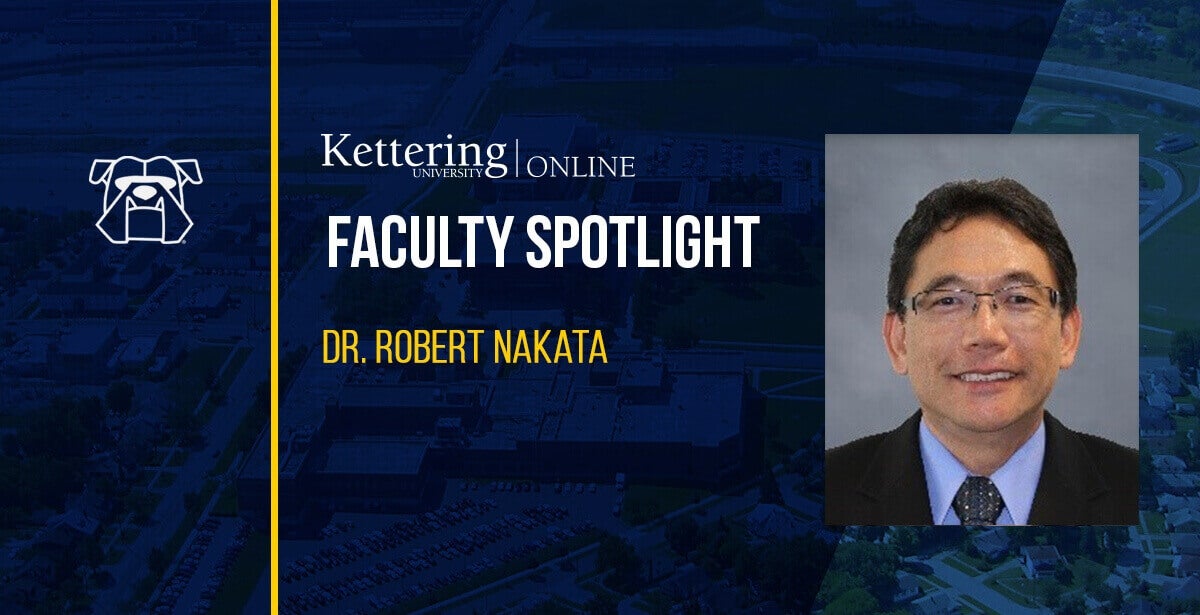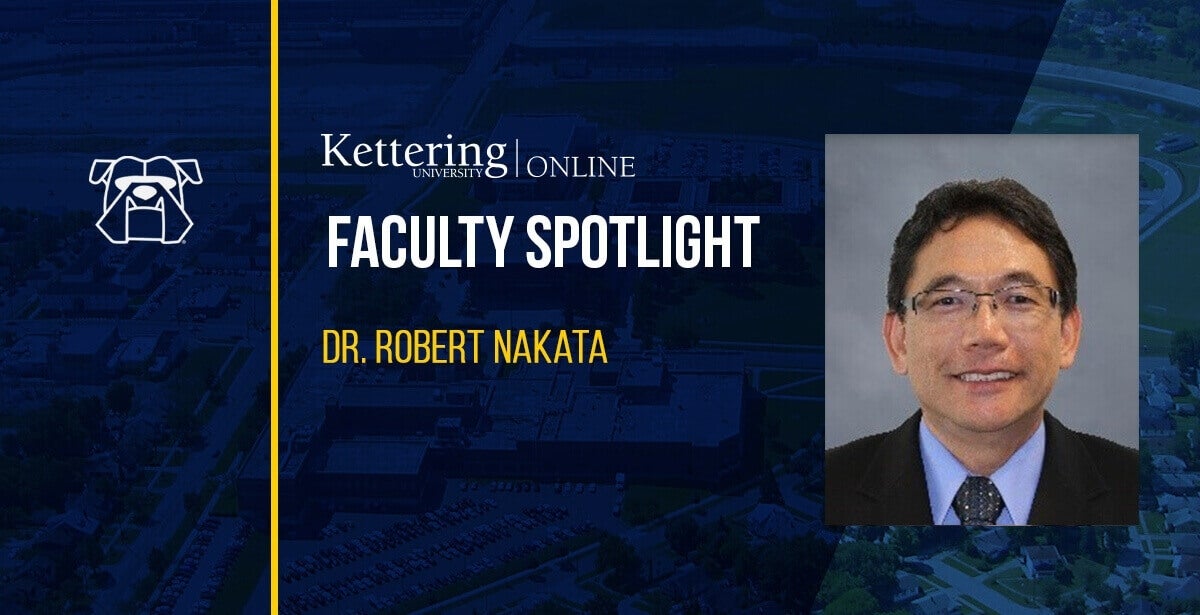
Faculty Spotlight: Dr. Robert Nakata
As Kettering University Online’s (KUO) Program Development Manager and Senior Instructional Designer, I have the pleasure of working with our Contributing Faculty members, and Faculty Mentors, many of whom are subject matter experts for the courses they teach. Coming from a wide range of educational, career, and geographical backgrounds, KUO faculty unite in the effort to link transformative experiential education to rigorous academic standards with real-world applications for learning that lasts a lifetime.
This time, we are happy to shine the Faculty Spotlight on Robert Nakata Ph.D. Dr. Nakata is a Silicon Valley serial entrepreneur with 35 years of experience serving as the CEO, CTO, Sr. Vice President of Operations and Vice President of Worldwide Engineering for startups and public companies. He is also a former US Air Force officer. Dr. Nakata has taught several courses in management, design thinking, innovation, and entrepreneurship, as well as electrical engineering and mechanical engineering courses. Currently he is an Assistant Professor of Engineering Innovation at the University of Hawaii where he teaches electrical engineering and MBA strategy courses, and also a Visiting Professor at Ritsumeikan University in Japan during the summers. Following are excerpts from our conversation:
Thanks so much for making the time to chat.
My pleasure.
My first question is always about where people were born and raised.
I grew up on US Air Force bases in Japan and Okinawa before moving to Hawaii where I graduated from high school.
Which degrees do you have and from which institutions did you receive them?
I received my BS in Electrical Engineering from MIT, my MS in Electrical Engineering/Computer Science also from MIT. I have an MBA from Wharton School of Business, University of Pennsylvania, and my PhD, also in Electrical Engineering, is from the University of Hawaii.
What attracted you to the field of electrical engineering?
When I was young, I was fascinated by wireless communications and by the age of 12 I earned my amateur radio license.
In brief, what is your teaching philosophy?
I believe in maximizing student engagement by making the class as experiential as possible. In traditional classes, I practice the inverted classroom, where students are expected to study the materials prior to class, and then apply what they’ve learned during classroom exercises. For an online class, I would mirror this approach by having students apply what they’ve learned in their assignments and relate it to their work situations. I include many real-world applications so that students are motivated to learn the material.
What are some ways that online instructors can make assignments interactive?
I would advise instructors who teach online try to include hands on hardware, if possible. For example, in my ECE 630 Digital Signal Processing class, I have students collect sensor data using an Arduino microcontroller. Then, they process the data using DSP techniques that they learned in the class.
Can you talk a bit about the search and rescue drone you designed during your Ph.D. program?
Sure, I’d be happy to. I invented a signal-processing algorithm that allows a drone-based radar sensor to detect respiratory motion from a hovering drone. Applications include search and rescue for victims who are buried alive in collapsed buildings and/or for military/counter-terrorism scenarios.
Your area of expertise lies at the intersection of engineering and business. What would you advise engineering students to know about business and or about capitalizing on an entrepreneurial opportunity? I would advise engineering students to take the time to learn as much as they can through independent reading or taking classes in Lean Startups, Design Thinking and the Business Model Canvas.
I’m aware of the lean startups topics and design thinking, but what is Business Model Canvas?
Business Model Canvas is a strategic management and lean startup template for developing new or documenting existing business models. It is basically a visual chart with elements describing a firm's or product's value proposition, infrastructure, customers, and finances. This application is likely to give students lots of information about the business side of engineering.
What would you say are the three top characteristics of an innovator?
I would say that innovators have to be persistent, comfortable with taking risks, have lots of ideas.
Speaking of being willing to take risks, how comfortable do you have to be with failure to be a successful innovator?
I would say very comfortable. It’s important to understand that failures are lessons learned that can be applied to future successes.
What is the best advice a professor ever gave you?
A physics professor taught me a methodical problem solving process that I continue to teach today.
Are there any particular career achievements or highlights you would like to share?
I met Steve Jobs back in the late 90’s and showed him our mobile wireless Internet device. I call it the “iPhone 0.”
What fun things do you like to do in your spare time?
I love to mountain bike and watch the waves at the beach to de-stress. I also like exploring the world via adventure travel. I’ve done the mountain gorilla hike in Rwanda, remote island hopped in the Philippines, and discovered onsens (hot spring baths) in Japan.
Thanks again for taking time to chat with me.
My pleasure.
KUO honors and appreciates Dr. Nakata for his contributions and highly regarded work with students.
At KUO, we are grounded by our past while innovating our future by designing, delivering, and supporting transformational educational experiences for a diverse global community. KUO is proud to announce that they received a perfect score, 100/100, for credentialing and training online faculty from The U.S. News & World Report Best Colleges Rankings for 2018!
If you are interested in becoming a student, visit Kettering University Online for information about our graduate degree programs.

